#saturnalia
Text

This winter solstice, the darkest day of the year, I wish you all peace, love and hope. As the days grow brighter, so may our troubled world.
*
Also, a heartfelt thank you to everyone who cheered me on through a year of personal struggle with likes and shares and encouraging comments. Your support for my art means the world to me ❤️ I didn’t have time to make a new and more appropriate card to go with this more-serious-than-normal message, so we’ll have to make do with season’s greetings from thirst trap Santa *ahem* I mean pagan fertility god. Hope he brings you a smile 🎅🏻❄️ (Somebody find him a sweater, it’s chilly out)
193 notes
·
View notes
Text



PARTY BANTER | ▶ Raising the dead with spores...
#baldur's gate 3#bg3 edit#bg3 gif#shadowheart#lae'zel#myconids.....#saturnalia#mygifs#saturnalia gif#video game edit#video game gifs#these are super messy but also i made these right before raid LOL#i really wanted to gif this scene it made me laugh#mmfrrfmmm getting back into gifing my beloved
236 notes
·
View notes
Text

Wishing you a lovely Saturnalia or Christmas or Festive Season and a happy start to 2024!
85 notes
·
View notes
Note
Is it true that gingerbread cookies were originally created for saturnalia? My friend just sent me this meme

Literally answered this last month, but I know Tumblr's search is absolute shit (even though it was tagged) so it's easy to miss.
Here's what I said then:
I feel like every year there's a new "did you know..." that inevitably turns out to be false.
This seems to be one of them.
First off, while ginger was a spice available to the Romans, there's no real link between them what we now know as gingerbread -- which is a much later invention. But that aside, the only sources I can find about a "man shaped cookie" connected to Saturnalia seem to go back to unsourced nonsense. Even the ones who cite something, if you follow the path to the source they do cite... it's one with no citations.
Written by a mystery writer.
And we fucking know exactly when gingerbread men were invented.
They were created for Queen Elizabeth I, who had the cookies cut to resemble visiting foreign dignitaries. And then they caught on.
So, if a person-shaped cookie existed in connection to Saturnalia (which I don't think it did but I will admit I wasn't exhaustive in my research), it is unrelated to the gingerbread man.
(Honestly this feels like yet another one of those things that got started with anti-Catholic propaganda 100-200 years ago and has become another ahistorical talking point -- but I'm just going off of vibes on that one)
So yeah. The romans didn't make gingerbread or man shaped cookies -- so "gingerbread men" are not a Saturnalia thing.
This is the new hill I'm going to have to die on, huh.
92 notes
·
View notes
Text


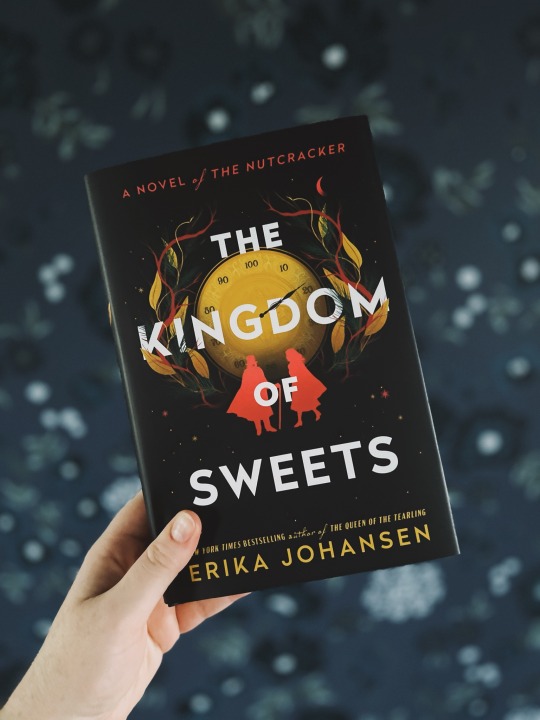
Some December hopefuls:
Saturnalia by Stephanie Feldman
The Winter Spirits anthology
The Kingdom of Sweets by Erika Johansen
#books#December tbr#saturnalia#Stephanie Feldman#the winter spirits#the kingdom of sweets#erika johansen
89 notes
·
View notes
Text
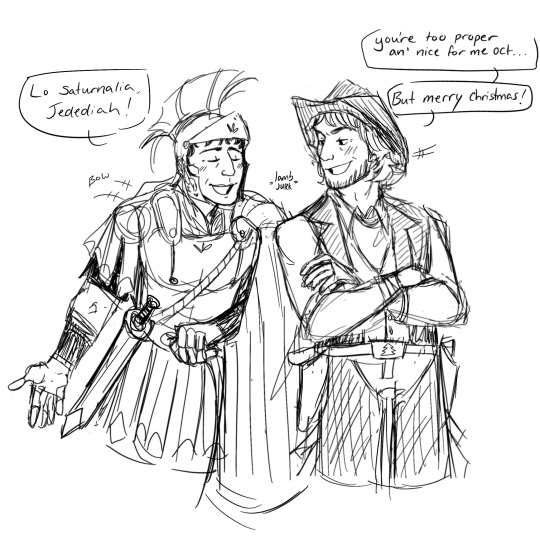

HAPPY HOLIDAYS, HAPPY HANUKKAH, MERRY CHRISTMAS AND EVERYTHING IN BETWEEN
yes i know that tree is garbage leave me alone
#jedediah#octavius#natm#night at the museum#night at the museum holidays#jedtavius#love you all <33#jedediah and octavius#saturnalia
857 notes
·
View notes
Text
Why Christmas is not related to Christ Jesus nor Christianity
A search on the internet will tell you that Christmas is a Christian holiday (I don't think I read that in the Bible) celebrating the birthday of Jesus Christ. Where in the Bible was the birth date of Jesus Christ given? It doesn't even give the date of the 25th of December. Christmas means "mass on Christ's day" how did it come to be that that was Christ's day? I know that He says He's Lord of the sabbath and that's God's day is the sabbath but Christmas? No. Christmas is the English term. "The earlier term Yule may have derived from the Germanic jōl or the Anglo-Saxon geōl, which referred to the feast of the winter solstice." Yule which is "the pre-Christian festival originating in Scandinavia which was later subsumed, along with other pagan celebrations, into the Christian holiday of Christmas." There are pagan roots, celebrations in it, how does it glorify Jesus? God? People might say, oh but they sing Christmas carols and there's the nativity. Please, it doesn't matter if that is done on that day when there are parts of Christmas which are contributed from celebrations offered to idols or possible pagan gods. "Yule celebrations began as a Norse festival called jol, although assessments of the purpose and traditions vary. Like most winter solstice festivals, themes of light, fire, and feasting are common threads. Some historians think that sacrifices were an important part of the observance, either to the gods and other supernatural beings (such as elves) or to the dead or both." "Since the early 20th century, Christmas has also been a secular family holiday, observed by Christians and non-Christians alike, devoid of Christian elements, and marked by an increasingly elaborate exchange of gifts. In this secular Christmas celebration, a mythical figure named Santa Claus plays the pivotal role." If it's really about Jesus Christ, why is there an image of a mythical man called Santa Claus? What does he have to do with Jesus Christ? As the quote above said, Christians and non-Christians celebrate it. Why would non-Christians, people who don't believe in, nor follow or have accepted Christ as their personal saviour, celebrate the day? How strange that is, a day allegedly dedicated to Christ is celebrated by a non believer who can celebrate that day yet still not want to seek or receive Christ Jesus. "The precise origin of assigning December 25 as the birth date of Jesus is unclear. The New Testament provides no clues in this regard. December 25 was first identified as the date of Jesus’ birth by Sextus Julius Africanus in 221 and later became the universally accepted date. One widespread explanation of the origin of this date is that December 25 was the Christianizing of the dies solis invicti nati (“day of the birth of the unconquered sun”), a popular holiday in the Roman Empire that celebrated the winter solstice as a symbol of the resurgence of the sun, the casting away of winter and the heralding of the rebirth of spring and summer. " Gosh, the Roman Empire and it's influence in Christianity is. . .I'm speechless. Many people are being led astray by their "traditions", "doctrines" etc. So much falseness. I'm not even surprised. Saturnalia: "The influence of the Saturnalia upon the celebrations of Christmas and the New Year has been direct. The fact that Christmas was celebrated on the birthday of the unconquered sun (dies solis invicti nati) gave the season a solar background, connected with the kalends of January (January 1, the Roman New Year) when houses were decorated with greenery and lights, and presents were given to children and the poor." "Saturnalia celebrations are the source of many of the traditions we now associate with Christmas, such as wreaths, candles, feasting and gift-giving." "The pagan celebration of Saturn, the Roman god of agriculture and time, began as a single day, but by the late Republic (133-31 B.C.) it had expanded to a weeklong festival beginning December 17. (On the Julian calendar, which the Romans used at the time, the winter solstice fell on December 25.)"
#christianity#christblr#christian#jesus christ#jesus#god#christian blog#spiritual enlightment#yule#pagan#christmas#saturnalia#santa claus#roman empire#winter solstice
68 notes
·
View notes
Text

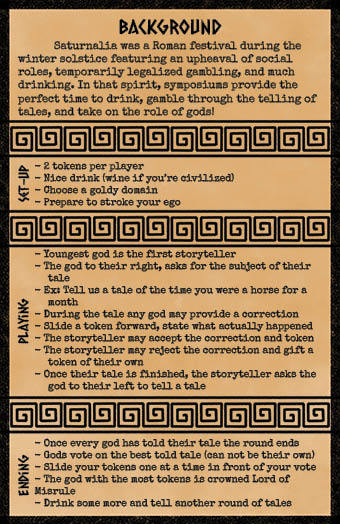
Celebrate Saturnalia with this holiday sized card game of godly braggadocio! Take turns relating to tales of your godly exploits, making them as humorous or fantastical as you would like. A delightful way to spice up your holidays with friends.
You can find it here!
Art was done by Obliesk
This game is a rules-lite hack of The Extraordinary Adventures of Baron Munchausen, which you should definitely check out!
52 notes
·
View notes
Text
The staff at the thermopolium said "happy holidays" instead of "Io Saturnalia". I can't stand this woke culture infecting the mind of the average Roman, this isn't what Caesar would have wanted. Stop making concessions to the Parthians
63 notes
·
View notes
Text

Wishing you all happy holidays, and a blessed birth of Sol Invictus, the Unconquerable Sun!
#hellenic polytheism#greek polytheism#hellenic pagan#paganblr#paganism#religion#hellenic paganism#theoi#roman paganism#roman polytheism#saturnalia#pagan
47 notes
·
View notes
Text

29 notes
·
View notes
Text

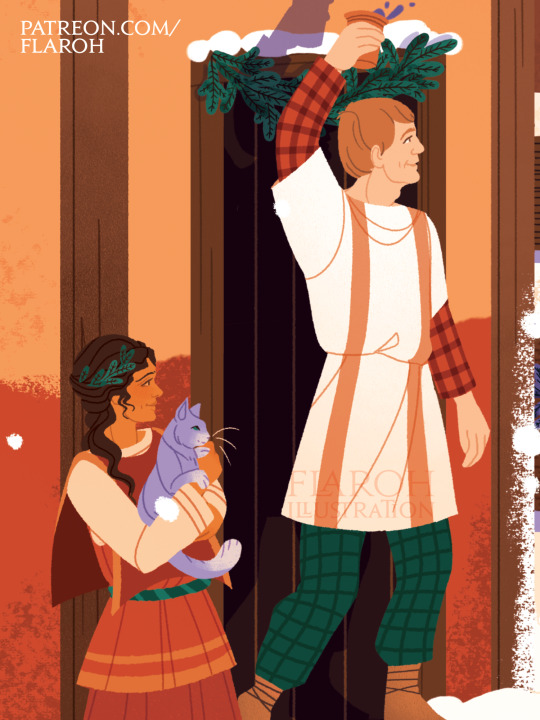
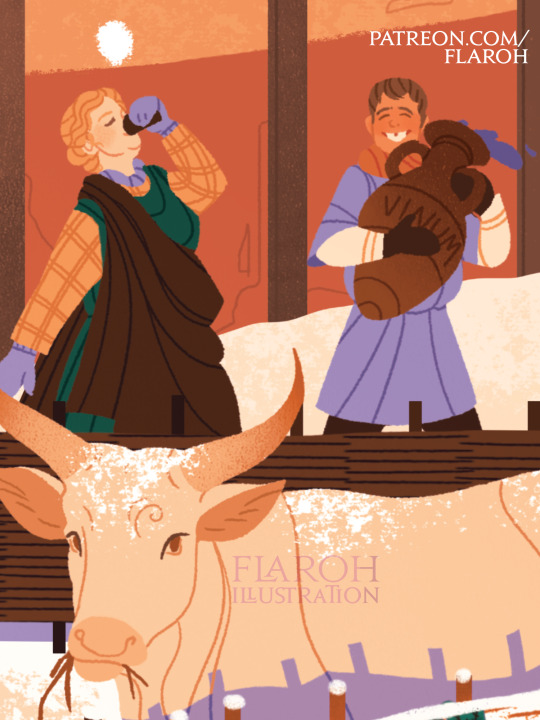
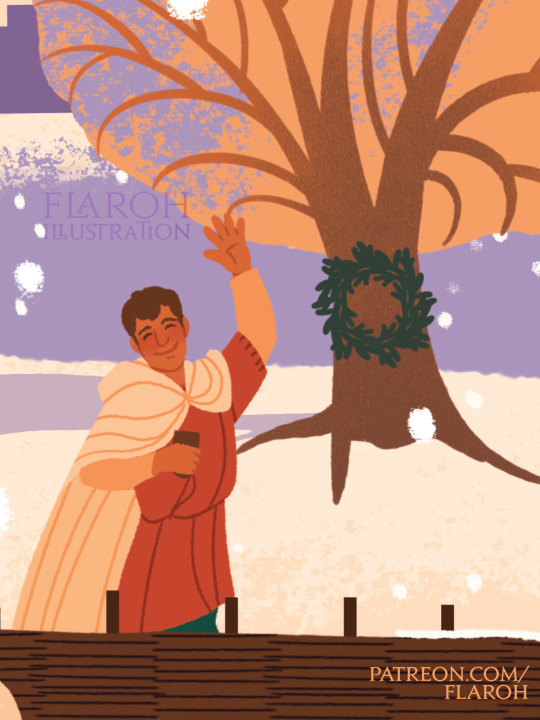
Saturnalia in Vindolanda 🪔🌨️🌲🏺
✨Get your own download file, postcard print, and/or sticker on my Patreon! I've also done a write-up on the inspiration and research behind this piece✨
December's illustration is a cozy scene of the vicus' neighbours coming together for a boozy Saturnalia 🥂 From December 17-23, Romans celebrated the god Saturn by feasting, exchanging gifts, lighting lamps, and switching up the normal societal class structures 🪔🪴🥧
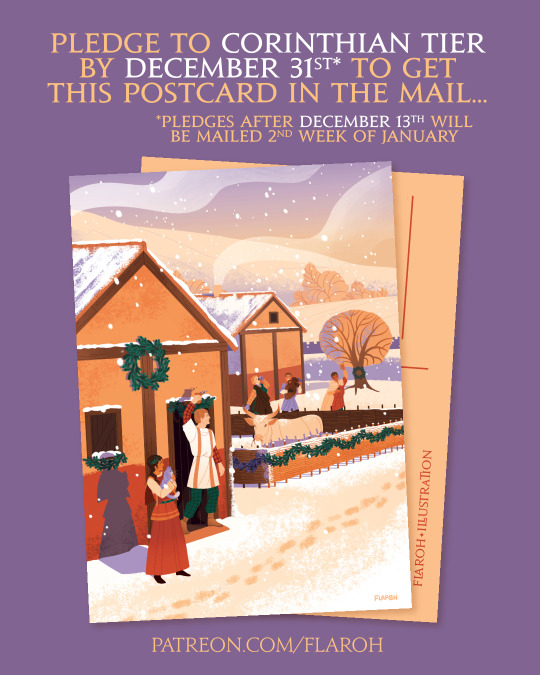
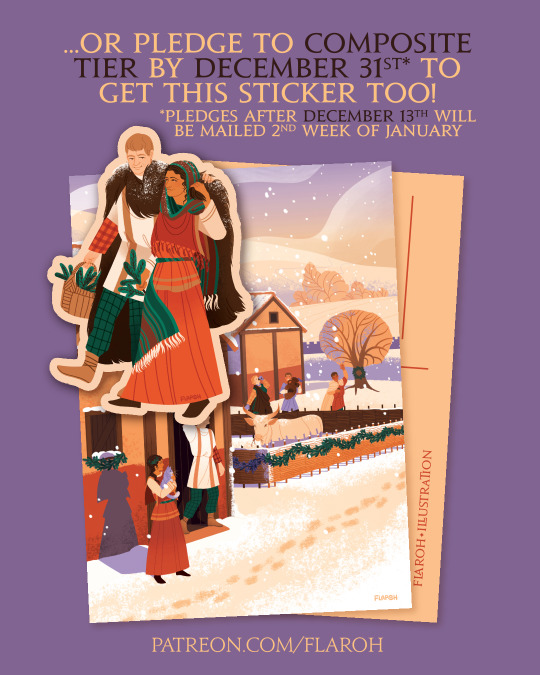
240 notes
·
View notes
Note
Did you know ginger bread men were created for Saturnalia?
I feel like every year there's a new "did you know..." that inevitably turns out to be false.
This seems to be one of them.
First off, while ginger was a spice available to the Romans, there's no real link between what we now know as gingerbread -- which is a much later invention. But that aside, the only sources I can find about a "man shaped cookie" connected to Saturnalia seem to go back to unsourced nonsense. Even the ones who cite something, if you follow the path to the source they do cite... it's one with no citations.
Written by a mystery writer.
And we fucking know exactly when gingerbread men were invented.
They were created for Queen Elizabeth I, who had the cookies cut to resemble visiting foreign dignitaries. And then they caught on.
So, if a person-shaped cookie existed in connection to Saturnalia (which I don't think it did but I will admit I wasn't exhaustive in my research), it is unrelated to the gingerbread man.
(Honestly this feels like yet another one of those things that got started with anti-Catholic propaganda 100-200 years ago and has become another ahistorical talking point -- but I'm just going off of vibes on that one)
59 notes
·
View notes
Text

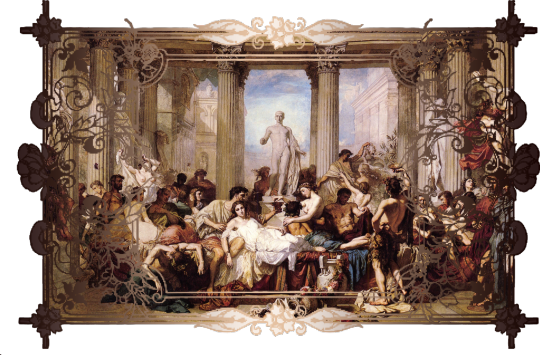


Saturnalia is coming on soon, so I'd like to speak some more on this peculiar, interesting festive occasion.
It is an Ancient Roman holiday of abundance, feasting, and celebration of harvest, which was supposed to be over by the time the festivities began. After the farmers gathered the crops, they'd celebrate Saturn, God of seed and sowing, for His generosity and richness of the harvest.
The festival, known for its abundant feasts and the peculiar tradition of switching roles of masters and servants, has a complicated history.



The origins of Saturnalia are much of a mystery as the festival appears to be so Ancient that Roman sources mark it to be older than the city of Rome itself. Saturnalia existed in both Greek and Roman tradition, though it corresponded to the Greek Kronia, which was a similar, but not an identical festival.
Sources speak on different possible origins of the holiday: some mention the temple of Saturn, the largest of the recorded by the pontiffs, being erected in Rome, and thus starting the tradition; whereas others speak on the festival being brought from Greece. Either way, this Ancient tradition is associated with the liberation of the God of harvest.
Saturnalia was officially celebrated on December 17 and, in Cicero's ties, lasted for a week (inclusively), until December 23. The length of the celebration varied depending on the time period as Augustus shortened it to three days only for the sake of letting the civil courts stay closed for less, while Caligula extended the celebration to five days. The original festival, according to Macrobius, appeared to have lasted for only a day; fourteen days before the Kalends of January. The Julian reform shifted the date to the 17th, thus making it into sixteen days before the Kalends. Some believe that the timing for Saturnalia was symbolic, as next followed Winter Solstice, or symbolic Death of the Sun and Birth of the new one.
Regardless, even after the limiting of the festival, Saturnalia seemed to still be celebrated for a full week with the last day being dedicated to Sigillaria, named so after sigillaria, the small earthenware figurines sold in the cities on that day. The original day of celebration was in turn given to Ops, the consort of Saturn and the Deity of abundance and the fruits of the Earth. The celebration in Her honor was called Opalia, and two festivals tended to mix together with Ops' worshippers sitting down during prayer to touch Earth, mother of all.
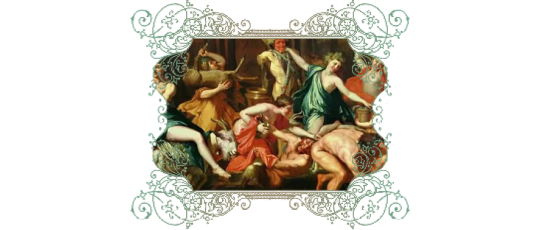


Saturnalia involved various activities akin to feasts, parties, gift-giving, and ritual rites. The party traditionally started with the guests exclaiming, i Saturnalia, believed to be a shortening from ego tibi optimis Saturnalia auspico, or 'i wish you a happy Saturnalia'.
It is believed to be one of the most delightful periods of the year and one of the most beloved Roman festivals. People went into the streets celebrating, marching, setting up shows and street markets. People of all backgrounds could participate in it.
Among the general aspects of Saturnalia were activities such as gift giving, as people exchanged things such as candles, walnuts, dates, and honey. Masters served slaves, whereas slaves became free men as in memory of Saturn's reign when slavery did not exist. Servants walked the streets masked, in Frigio hats, or hats of liberation. The Saturnals were also celebrated in the army; the party was called the Saturnalicium castrense, when the low-rank soldiers sat next to the generals as equals and toasted together. Dice games and public gambling were allowed, but became prohibited again once Saturnalia ended. Mourning was abolished, while courts and schools were closed; starting war or enforce capital punishment was strictly prohibited. The festivities took such a great degree of chaos that some authors of the time report moving to remote suburban houses for the week of the Saturnalia to avoid the noise.
Saturn was one of the few celebrated Deities, as, in Roman times, Dis Pater and Proserpina were also believed to join the festive processions in winter time. They were to be appeased by gifts, festivities, and food; which was believed to make Them return to the Underworld where, as the Gods of subsoil, They would protect the crops and make them sprout in spring.
The official part of the feast consisted of a solemn sacrifice in the temple attended with bare head and during which the wool bandages that wrapped the feet of Saturn's simulacrum melted. A public banquet followed where all the guests exchanged toasts and wishes.
Further celebratory activities were split into days, and precise rites were done on each day of the festival.


At the beginning of Saturnalia, a rite of lectisternium was held. During the ritual, statues of Jupiter and 12 Olympians were seated in a dining position upon a special bed, or couch, and offered food, prayers, and gifts. They were spoken to with due respect and asked for protection of Rome and its people as well as for help with current affairs. After the first step, a procession was sent off to the Temple of Saturn and animal sacrifices were made at the site.
A banquet with cheeses, focaccia, olives, and wine was held, to which everyone was invited - all provided by the state.
Starting day one, no-work days began, and gifts as well as greeting cards were exchanged between the citizens. Myrtle, laurel, and ivy - symbolic elements of the Saturna - were given; the trees were respectively sacred to Venus, Apollo, and Bacchus. The first day was signified by banquets, during which the Princeps of Saturnalia, the ruler of the festivities, Princeps Saturnalicius, was elected. During the first day of the festival, people changed from togas to synthesis and pileus; a casual home robe and a cap like headdress.


On the second day of the festival, Rome was still abundant with noise and feasts, to which everyone invited everyone. Stalls and juggles were in the streets alongside dancers and musicians. Celebrations were accompanied by the feast in honor of Epona, Celtic Goddess of horses, much adorned by the equites, whose importance during Saturnalia was due to Her connection to fertility and richness of feasts. The second day of Saturnalia, the 18th of December, marked the beginning of the triad of days of Mercatus, much similar to today's city fairs.


The third day of Saturnalia was the initial day of the celebration (before the reform of the calendar) and was devoted to the Goddess Ops, Deity of Sabine origin introduced to Rome under Titus Tatius. She was praised as the Deity of abundance, protector of rich harvest, giver of fruits of the Earth, and respected consort of the God Saturn. Her Temple at the Capitol hill was erected on that day, and thus received attention and became a center of worship of the Goddess as it was the anniversary of its establishment. Ops was prayed to and asked for blessings of harvest.


The fourth day of the Saturnian festivals, December 20, was dedicated to gift-giving and worship of the Lares, house guardian Deities of Ancient Rome. Terracotta figurines, sigillaria, were made out of paste, wax, or terracotta. Bronze statues were a rarity as bronze was expensive, while sigillaria made out of sweet dough were meant for the children. These statuettes were exchanged as gifts between the citizens as well as given to Saturn as offerings. He was seen as the God of time, and, thus, Death, and the figurines were to be given to Him as ways to redirect Death from coming for the giver, instead letting the figurine take it.


On the fifth day, Rome was filled with visitors from all across the Empire who came to see the city at its peak, blooming with festivals and street activities such as shops, shows, and a multitude of banquet spots. Fod, souvenirs, sigillaria (sigillaria<sigillum<signum+illum), clothes, ornaments and jewels were sold on the street. Artisans from all over the Empire offered goods made of leather, wood, terracotta, bronze, brass, silver and a special alloy of gold and silver, electrum.


On day six of the festivities Rome welcomed dancers, singers, and other performers from across the Empire who came to join the celebration as the entirety of the Empire was involved in it. Gift-exchanging with the guests, also known as xenia, was performed. Marcus Valerius Martialis wrote Xenia and Apophoreta for the Saturnalia, both of which were published in December and intended to accompany the "guest gifts" that were given at that time of year.


On the seventh - and last - day of the celebrations the Gods were thanked for everything given. The streets were full of torches and braziers, and the day passed between banquets and the baths decorated with ribbons and garlands for the occasion. Aulus Gellius relates that he and his Roman compatriots would gather at the baths in Athens, where they were studying, and pose difficult questions to one another on the ancient poets, a crown of laurel being dedicated to Saturn if no-one could answer them.
Saturnalia ended at sunset.
Sources in pinned.
#𓆩𝕍𓆪 ˣ 𝐅𝖊𝖗𝖎𝖆#hellenism#theoi#helpol#hellenic polytheism#roman polytheism#roman festival#religio romana#saturnalia#io saturnalia#witchblr
205 notes
·
View notes
Text
I know this post is now several weeks late, but I just wanted to say: if the holidays are hard for you, it's ok.
Just because there's a societal celebration doesn't mean you have to suppress your feelings.
You're not required to be happy during Hanukkah, Christmas, Kwanzaa, Yule, Saturnalia, Boxing Day, Las Posadas, Ōmisoka, New Year's Eve/Day, Lunar New Year, or any other holiday. Your grief, your stress, your pain is real. And it deserves to be recognized. It doesn't magically go away just because of the time of year; you're allowed to need help!
Winter is actually pretty hard for a lot of people! Seasonal depression is real, and even if you don't experience that, I think everyone gets a little tired of the cold after the first few weeks.
The point is: it gets better. Springtime is just around the corner, and you won't have to deal with any of this for another 12 months. That in and of itself is worth celebrating!!You're doing amazing!
🖤💜💙💚💛
#holidays#christmas#hanukkah#chanukah#kwanzaa#yule#saturnalia#boxing day#las posadas#omisoka#new year's eve#new year's day#lunar new year#chinese new year
33 notes
·
View notes
